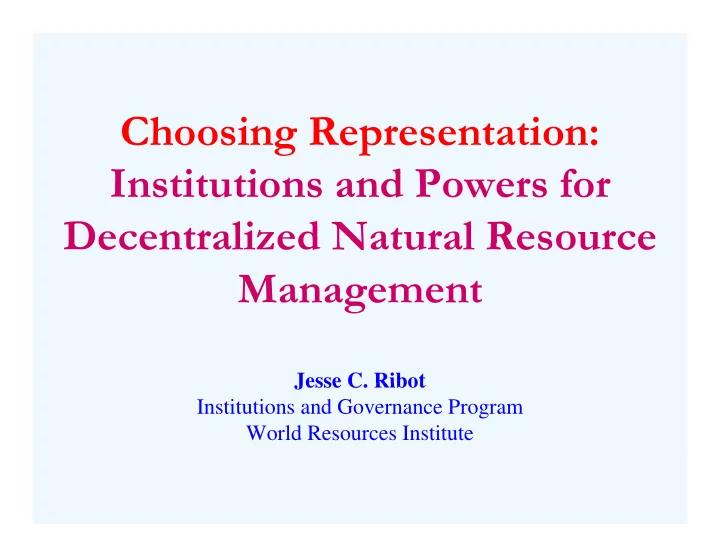

Choosing Representation: I Institutions and Powers for i i d P f Decentralized Natural Resource Decentralized Natural Resource Management g Jesse C Ribot Jesse C. Ribot Institutions and Governance Program World Resources Institute
Today’s Talk � Program: Decentralization and Environment Comparative Research Program � Analytic Framework: Actors, Powers and Accountability Research Framework � Findings: Decentralization in Practice Fi di D t li ti i P ti � What is happening in the name of decentralization? � Why? � Why? � Focus on Implementation rather than Outcomes � Recommendations: Options and Opportunities
Defining Decentralization Defining Decentralization = � A transfer of powers from central � A transfer of powers from central government to lower levels IN a political administrative territorial hierarchy administrative territorial hierarchy.
Defining Central Government Decentralization Decentralization Donors Ministries: Ministries: Big NGOs -Health -Environment Power Transfers -Education…. Contracts & Grants Non-market Privatization Individual or Corporation NGO Democratic Administrative Customary PVO Local Local Authority Authority CBO Government Government Participation Participation 3rd Sector Government Not Decentralization Not Decentralization Decentralization Decentralization
Central Government Ministries: Donors D -Health Accountability -Environment Big NGOs -Education…. ? Co-Management Co-Management ? Democratic Participation Administrative NGO Customary Local Individual or Local Authority PVO Authority Government Corporation CBO ? ? ? Committees Strong Weak Questionable Local Populations p
Why Decentralize? Theoretical Mechanisms of Theoretical Mechanisms of Decentralization Benefit Advertised Benefits � Enfranchisement, Equity, Efficiency, Development, Better Resource Management, Better service delivery, Benefit retention…. Mechanisms � Local Authorities are believed to: � Better match services to needs and aspirations (public choice theory) � Reduce transaction costs (new institutional eco.) by proximity allowing: � Reduce transaction costs (new institutional eco.) by proximity allowing: � Mobilizing local knowledge and skills for collective/public good � Mobilizing local labor for collective projects � Improved coordination among local programs � Balance of negative and positive outcomes in decision making B l f ti d iti t i d i i ki (economic theory of “internalizing externalities”) � ALL ARGUMENTS IMPLY INCLUSIVE & INTEGRATIVE � ALL ARGUMENTS IMPLY INCLUSIVE & INTEGRATIVE MECHANISM: I.e. Representation = Downwardly Accountable INSTITUTIONS * With* POWERS
Representation Policy Model � Representation � Representation = When authorities act in When authorities act in the best interest of the public [Pitkin; Manin, Przworski and Stokes] Przworski and Stokes] � Representation is the active ingredient R t ti i th ti i di t making decentralized institutions effective [S [Smoke] k ]
REPRESENTATION = Responsiveness &/or Accountability p y Responsiveness Accountability Policies Outcomes M Mandates d t Sanctions Preferences Signals
Elements of Representation � Responsiveness = f(Powers/Capabilities � Responsiveness f(Powers/Capabilities [internal powers]) � Accountability = f(Sanctions or A Accountability t bilit mechanisms)
Actors Powers & Actors, Powers & Accountability Framework � Positive Outcomes are Expected from: p � Local Actors (individuals or Institutions) oca cto s ( d dua s o st tut o s) � With Powers (executive legislative and judicial: � With Powers (executive, legislative and judicial: discretion+capabilities to exercise them) � With Accountability to the Local Population
I Implementation Findings: l t ti Fi di What Happens in Practice? What Happens in Practice? Choice of Institutions in Practice P Power Choices in Practice Ch i i P ti
Government Tactics for Government Tactics for Retaining Control g � Choice of Institutions � Resisting Power Transfers � Resisting Power Transfers
Getting the Institutions Right? g g � Decentralization theory is an IF-THEN proposition y [out of new institutionalism] � If we have the right institutions with the right powers � Then we get all these positive outcomes � But we’re not getting to ‘IF’ in most cases � New institutionalism is being stomped out by a larger set of political-economic forces [Sort of like “Bambi Meets Godzilla”]
New Institutionalism Meets Political Economy
CONCLUSIONS � What do we need to do?
Subsidiarity Principles Principles of Institutional Principles of Institutional Choice
Ideal Central Government Accountability Ministries: -Health of Institutions -Environment -Education…. Accountability A t bilit Power Transfer Democratic Individual or Administrative Local Corporation Local Authority Government NGO/ PVO Customary CBO CBO Authority Committees L Local Populations l P l ti
THE END* THE END
Recommend
More recommend